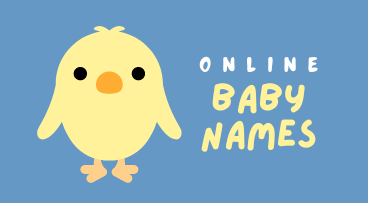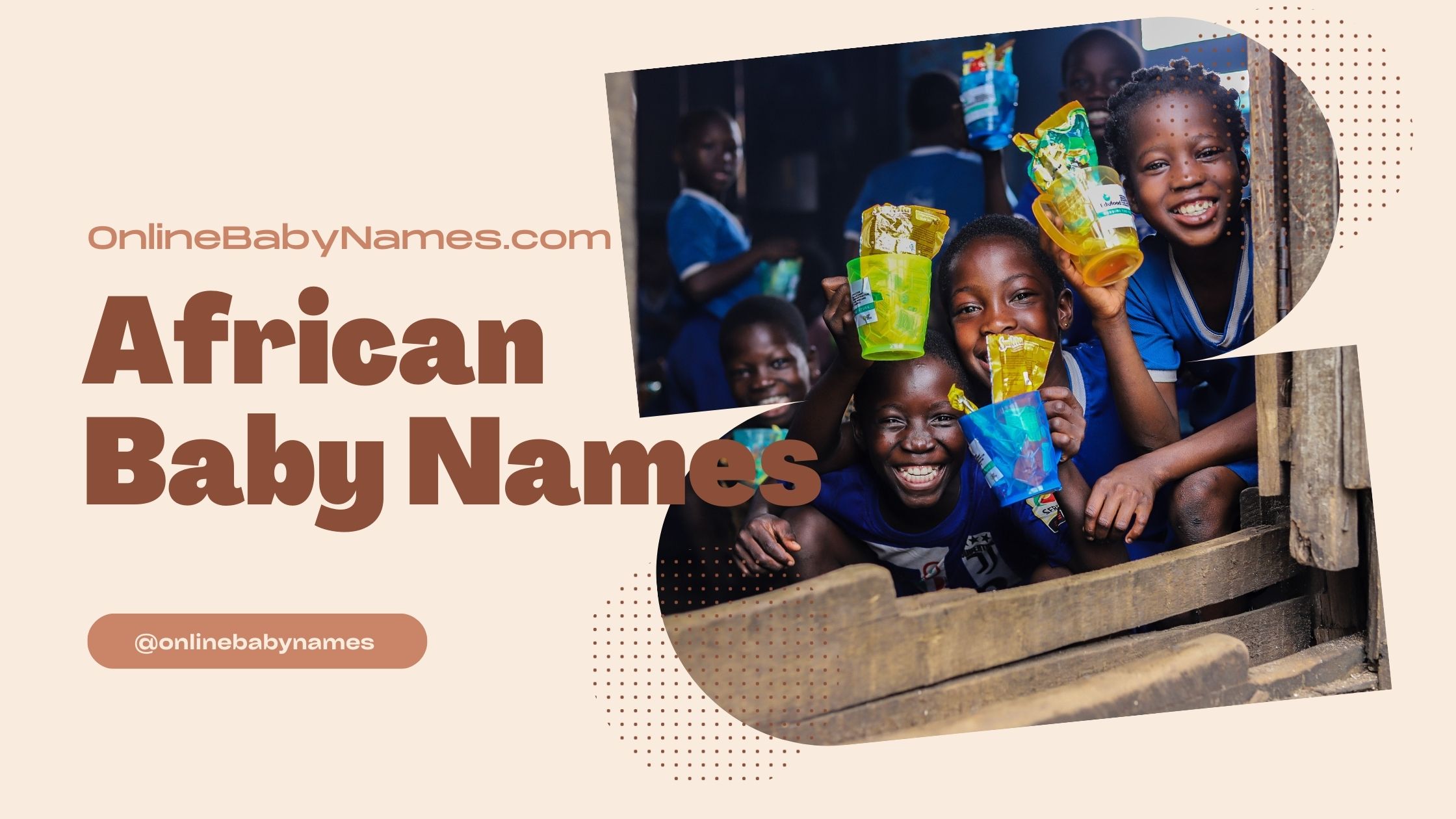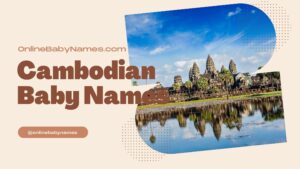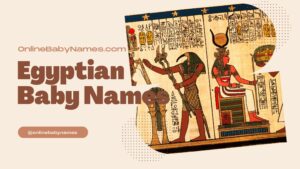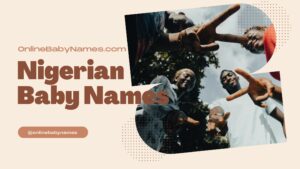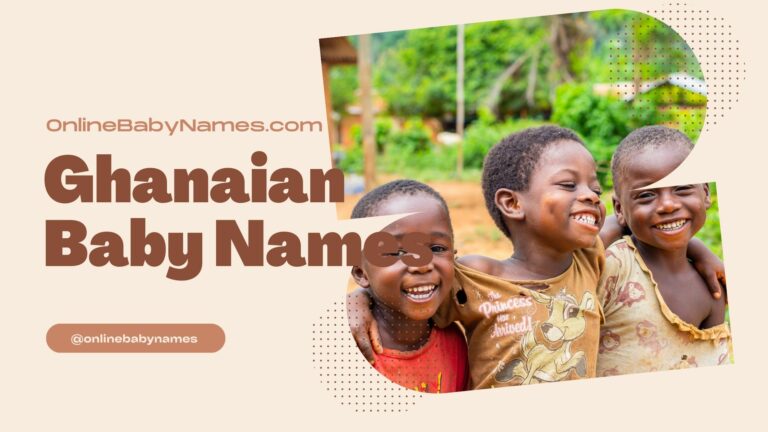
Choosing the perfect name for a newborn is a significant decision for parents all over the world. In Ghana, parents believe that a child’s name has the power to shape their personality and destiny. Rooted in culture, tradition, and spirituality, Ghanaian baby names often come with deep meanings and strong connotations that reflect the family’s ancestry, values, and expectations for their children.
In Ghana, it’s common for parents to choose names based on specific ethnic groups, such as the Akan, Ewe, Ga-Adangbe, and Dagomba. These groups have distinct naming customs, such as naming a child based on the day of the week they were born, using gender-specific prefixes, or bestowing names that praise deities, ancestors, or virtues.
Besides cultural and ethnic considerations, many Ghanaian parents might also opt for more modern or trendy names. While keeping their rich cultural heritage in mind, these parents seek a balance between honoring traditions and embracing contemporary society. In the end, every name choice is deeply personal and reflects the parents’ emotions, aspirations, and love for their child.
Understanding Ghanaian Names
Ghanaian baby names carry a strong cultural significance, and understanding their meanings is crucial for parents choosing a meaningful name for their child. These names are typically derived from several ethnic groups and languages, with each name holding a unique story and distinct heritage value.
Akan names, for instance, are one of the major ethnic groups in Ghana, and their names often reflect the circumstances of a baby’s birth. These names have a deeper meaning and are organized around a seven-day naming system, called the “Nkrabea.” This system gives newborns a first name corresponding to the day of the week they were born. A few examples include:
- Monday – Kwadwo/Kojo (male), Adwoa (female)
- Tuesday – Kwabena (male), Abena (female)
- Wednesday – Kwaku (male), Akua/Akuba (female)
Another exciting aspect of Ghanaian names is the concept of family names. These are derived from the child’s ancestors and can provide a link to their family lineage, history, and even traditional occupations. For example, Ghanaians who belong to the Ewe ethnic group often have surnames like “Ametefe,” “Agbogah,” and “Vormavor.”
Additionally, indigenous Ghanaian cultures often use names that have specific meanings, thereby allowing their meanings to have a significant influence on a child’s life. Some popular names with meanings include:
- Aisha (female) – “Life, the one who lives”
- Kofi (male) – “Born on Friday”
- Ayana (female) – “Beautiful flower”
- Ato (male) – “Born on Saturday”
- Efia (female) – “Born on Friday”
Parents looking to give their children an authentic Ghanaian name should also consider several other unique cultural customs such as the naming practices of the Dagaaba ethnic group. They primarily consider the child’s sex and assign names accordingly. For example, girls’ names often end with “ri,” while boys’ names end with “su.”
Moreover, many Ghanaian parents opt to avoid widely popular names and instead choose unique and rare names that reflect personal qualities, attributes, or memorable events. Through this decision, they strive to provide their children with a genuine and original identity.
In conclusion, Ghanaian baby names hold immense cultural and spiritual importance. These names serve not only as identifiers but also exemplify the unique aspects of a person’s lineage and heritage. Anyone interested in using a Ghanaian name for their child should carefully consider factors like meaning, cultural customs, and family history for a truly meaningful selection.
The Akan Naming System
Among the many beautiful traditions in Ghana, the Akan naming system plays a significant role in the country’s rich cultural heritage. This time-honored tradition has persisted through the generations, and it’s a fascinating aspect of Ghanaian baby names that deserves a closer look.
The Akan people make up a majority of the population in Ghana, and their naming system is heavily influenced by both their culture and their beliefs. Central to the Akan naming system is the concept of “day names” or Kradin. Each day of the week has a designated name for both male and female babies born on that day. I’ll provide a simple breakdown below:
| Day of Week | Male Name | Female Name |
|---|---|---|
| Monday | Kwadwo | Adwoa |
| Tuesday | Kwabena | Abenaa |
| Wednesday | Kwaku | Akua |
| Thursday | Yaw | Yaa |
| Friday | Kofi | Afia |
| Saturday | Kwame | Ama |
| Sunday | Akwasi | Akosua |
Along with these day names, it’s common for Akan babies to be given an additional name. This extra name could be inspired by family traditions, circumstances surrounding the birth, or the parents’ personal beliefs and aspirations for the child.
Furthermore, the Akan people observe the naming practice of Abusua, which means family or clan. There are eight Abusua groups in Akan culture, and each has its own totem and heritage. Every child inherits their mother’s Abusua, which defines their lineage, responsibilities, and roles within the family and community.
A few other aspects contribute to the uniqueness of the Akan naming system:
- Soul names: Also known as Sunsum kradin, these names are deeply spiritual and believed to have a connection to the child’s soul. Soul names enhance someone’s character, influence their lives positively, and safeguard them from harm.
- Occupational names: In some cases, an Akan child may also receive a name related to the family’s occupation or trade. For example, a blacksmith might name their child “Takyi,” which means “iron.”
While the Akan naming system may appear complex, it highlights the immense importance placed on family, community, and spiritual connections in Ghanaian culture. So, when choosing a Ghanaian baby name, it’s certainly worth considering the rich tapestry of Akan traditions.
Popular Male Baby Names
When it comes to Ghanaian baby names, there’s a richness in meaning and cultural significance. In this section, I’ll take you through some popular male baby names that stand out in Ghanaian culture and provide you with their meanings, origin, and pronunciation. You’ll notice that many of these names are related to the day of the week a child is born, reflecting the deep-rooted belief that a child’s destiny may be intertwined with the day they are born.
To make it easier for you, I’ve put together a Markdown table for the top 5 popular male baby names:
| Name | Origin | Meaning | Day of the Week Born |
|---|---|---|---|
| Kwame | Akan | Born on a Saturday | Saturday |
| Kofi | Akan | Born on a Friday | Friday |
| Kwesi | Akan | Born on a Sunday | Sunday |
| Yaw | Akan | Born on a Thursday | Thursday |
| Kwaku | Akan | Born on a Wednesday | Wednesday |
Here’s a closer look at some other popular male baby names in Ghana:
- Nana: This name is quite popular among Ashanti and Akan people. It’s often used as a title and means “King” or “Chief.”
- Kwabena: With Akan origin, this name is given to boys born on a Tuesday. It signifies bravery and one who is resourceful.
- Kwadwo: Hailing from Akan culture, this name means “born on a Monday” and is believed to bring with it peace and tranquility.
- Sena: Of Ewe origin, Sena is a popular name for boys, which means “Fortune” or “Luck.” It carries an optimistic connotation, reflecting hope for prosperity and good fortune.
- Ato: Fante and Akan people often give this name to boys, meaning “one who is generous.” This name instills the virtues of kindness and benevolence.
Don’t be surprised to find that some Ghanaian male baby names share meanings across different ethnic groups. After all, the beauty in naming lies in the fact that it transcends language barriers and geographical confines. And no matter the origin, these names carry a unique charm and connection to Ghanaian culture, making them meaningful choices for your little one.
Popular Female Baby Names
Ghanaian culture has a strong tie to its baby naming process, with traditional and meaningful names often reflecting family values and aspirations. In this section, I’ll present some popular Ghanaian female baby names that are both unique and meaningful to Ghanaians.
Abena – Meaning “born on a Tuesday,” Abena is an Akan name given to girls born on this specific day. Ghanaian parents believe that each day of the week has distinct characteristics, and Abena embodies the strength and warmth associated with Tuesdays.
Adwoa – Similar to Abena, Adwoa denotes a girl born on Monday and symbolizes peace and tranquility. As the first day of the week, Monday is considered a fresh start; therefore, the name Adwoa represents an opportunity for positive growth.
Efia – This beautiful name has its roots in the Akan language and is given to girls born on Friday. With Friday’s associations of excitement, happiness, and carefree nature, Efia embodies a sense of joy and adventure.
Akua – Wednesday-born girls often receive the name Akua. As the middle of the week, Wednesday is linked to balance, stability, and wisdom. With these qualities in mind, Akua symbolizes a strong and reliable foundation for life.
Ghanaians also cherish names that convey significant personal and cultural values. Here are some honorable mentions:
- Ama – A powerful name, Ama means “born on a Saturday” and represents the characteristics of love, patience, and unity.
- Nana – A highly respected title often given to first-born daughters, Nana indicates leadership and nobility.
The following table highlights more popular Ghanaian female baby names with their respective meanings:
| Name | Meaning |
|---|---|
| Afia | Born on a Friday |
| Yaa | Born on a Thursday |
| Kakra | Younger twin |
| Esi | Born on a Sunday |
In conclusion, Ghanaian female baby names demonstrate the importance of traditional customs and family values. Unique and culturally rich, these names not only signify the day of the week that the child is born but also embody distinct qualities that parents hope will be reflected in their daughter’s life.
Influence of Cultural Heritage
When considering Ghanaian baby names, it’s important to recognize the strong influence of the cultural heritage in the naming process. Ghana’s rich history and diverse traditions play a significant role in the selection of names, often carrying specific meanings and showcasing the country’s unique blend of ethnic groups.
One fascinating aspect of Ghanaian naming culture is the Akan names. These names are widely adopted by the Akan people, one of the largest ethnic groups in Ghana. A distinctive feature of Akan names is the adoption of a “day name,” which is determined by the day of the week the child is born. Some examples of Akan day names include:
- Kwame (Saturday)
- Akua (Wednesday)
- Yaa (Thursday)
Not only does this tradition have deep cultural roots, but it also implies a sense of unity among the Akan people regardless of their specific subgroup.
Another naming tradition is through the Ewe people, who inhabit the Volta Region in Ghana. They often choose names that reflect the circumstances around the time of the child’s birth, such as the season or other relevant events. Ewe names may also be given to honor ancestors or extended family members.
Ghanaian baby names can also be inspired by the religious beliefs of the family. Due to the prominence of Christianity and Islam in Ghana, many families choose names with biblical or Islamic origins. For instance, some Ghanaians with Christian backgrounds may select names derived from the Bible, while those with Islamic roots may choose names from the Quran.
Moreover, many Ghanaian names carry significant meanings that reflect the hopes and aspirations of the parents for their child. These names often speak to qualities such as strength, wisdom, or beauty.
Here’s a brief overview of some popular Ghanaian baby names and their meanings:
| Name | Meaning |
|---|---|
| Adjoa | Born on Monday; peace and happiness |
| Kofi | Born on Friday; strong, decisive |
| Nana | Born a leader, royal |
| Efia | Born on Friday; brings light, warmth |
| Kwaku | Born on Wednesday; adventurous spirit |
As we can see, the influence of cultural heritage in Ghanaian baby names offers a wide range of options for families to choose from. These names serve to preserve the diverse cultural traditions of Ghana and create a sense of identity and pride in one’s heritage.
Names Inspired by Nature
Ghanaian baby names that are inspired by nature often carry deep cultural and spiritual meanings. Many of these names reflect the local flora, fauna, and natural phenomena, making them both unique and meaningful for new parents. Here, I’ll share some beautiful Ghanaian baby names inspired by nature.
Flora-inspired names hold a special place in Ghanaian tradition. With rich vegetation and a diverse range of plant life, it’s no wonder parents choose names that represent this aspect of nature. Some popular flora-inspired names include:
- Agyapong: A beautiful tree
- Ankoma: A unique and rare tree
- Afari: A species of fig tree
Fauna-inspired names also feature prominently in the rich Ghanaian naming tradition. These names often symbolize the strength, beauty, or character of the animal they represent. A few fauna-inspired names are:
- Obeng: A swift antelope
- Piesie: A mighty eagle
- Kontomire: A type of bird that is known for its abundance
In addition to flora and fauna, natural phenomena can also inspire Ghanaian baby names. Such names serve as a reminder of the cultural appreciation for the power and beauty of nature. Here are some examples:
- Afram: A river in Ghana, symbolizing abundance and life
- Nyankonton: God’s rainbow, representing hope and promise
- Asuo: A body of water, signifying adaptability and resilience
While finding the perfect Ghanaian baby name that’s inspired by nature might seem like a daunting task, it’s important to remember that the meaning behind the name is what truly makes it special. Consider the traits and characteristics you wish for your child to embody, as these nature-inspired names often carry powerful symbolism. Whichever name you choose, it’ll be a wonderful reflection of both the natural world and Ghanaian culture.
Ghanaian Unisex Baby Names
Diving into the world of Ghanaian baby names, I’ve found that there’s a beautiful assortment of unisex options that hold deep cultural roots while maintaining a modern appeal. Many of these names showcase Ghanaian values and beliefs, reflecting the unique qualities parents would like their children to embody. In this section, I’ll share some popular Ghanaian unisex baby names that capture the essence of Ghanaian culture.
To begin with, Akan names are quite common in Ghana. These names are given based on the day of the week a child is born and the order in which they were born. The table below lists some of these names:
| Day of the week | Male name | Female name |
|---|---|---|
| Monday | Kwadwo/Kojo | Adwoa |
| Tuesday | Kwabena | Abena |
| Wednesday | Kwaku | Akua |
| Thursday | Yaw | Yaa |
| Friday | Kofi | Afua |
| Saturday | Kwame | Ama |
| Sunday | Akwasi | Akosua |
These names can easily be utilized as unisex names by simply combining the male and female names or choosing one of them that resonates with the desired characteristics.
In addition to the Akan names, other popular Ghanaian unisex baby names include:
- Anane: Meaning “fourth-born child” in Akan
- Boateng: A name meaning “warrior” or “a brave person” in the Ashanti dialect
- Nhyira: Signifying “blessing” in Akan
- Amo: Meaning “God’s gift” in the Twi language
Ghanaian parents often pick names that reflect their child’s destiny, personal characteristics, or connection to ancestors and traditions. Below are more examples of meaningful unisex names:
- Afari: A person who has overcome challenges; a strong person
- Amankwa: An expression of the belief that God provides protection and comfort
- Ata: Born after twins
- Obiara: A compassionate person; one who displays empathy
It’s crucial to respect and acknowledge cultural sensitivities when choosing a Ghanaian unisex baby name. By embracing these names, not only are we paying tribute to Ghana’s rich heritage, but we’re also creating space for diverse, meaningful, and powerful identities for the future generation.
Naming Ceremonies in Ghana
One of the most important aspects of Ghanaian culture is the naming ceremony, which holds great significance for families and communities. In this section, I’ll discuss the different aspects of these ceremonies and their importance in Ghanaian society.
Akan Naming Ceremony
Among the Akan people, the naming ceremony is known as the “outdooring” ceremony. It takes place on the eighth day after the baby’s birth, in accordance with their belief in the soul’s journey. The ceremony often begins early in the morning when the baby’s maternal aunt immerses the baby in water mixed with specific herbs and prayers. This rite is performed to cleanse the baby’s spirit and usher in good health and fortune.
Following the cleansing, the baby’s paternal family brings gifts to welcome the newborn into their lineage. Important naming particulars include:
- Baby’s given name: reflects the day of the week on which the baby was born
- Surname: derived from the father’s family lineage
- Adinkra symbols: artistic symbols representing the child’s character and virtues
Next, family members and friends gather to celebrate the baby, often sharing wisdom, blessings, and aspirations for their future. The entire ceremony acts as an opportunity to forge solidarity within the community.
Ga-Adangme Naming Ceremony
Within the Ga-Adangme community in Ghana, naming ceremonies are held on the morning of the seventh day after the baby is born, coinciding with their traditional week. Like the Akan ceremony, the baby is bathed in a mixture of water and herbs, symbolizing purification. The baby is then presented to the community, and their name is officially announced.
In Ga-Adangme culture, a baby’s name typically reflects the child’s spiritual essence and often includes references to ancestors or meaningful qualities. Once the baby’s name is announced, the community celebrates with singing, dancing, and feasting.
Value of Naming Ceremonies
Naming ceremonies in Ghana serve multiple purposes:
- Reinforcing community bonds
- Celebrating the child’s individuality
- Instilling a sense of responsibility in parents and community members
- Signifying the beginning of the child’s journey in life
In conclusion, naming ceremonies in Ghana provide a valuable and meaningful opportunity for families and communities to come together. They help reiterate values, create strong relationships, and ensure that each child is acknowledged and celebrated with equal importance.
Impact of Christianity on Baby Names
Christianity has had a significant impact on Ghanaian baby names over the years. With the arrival of missionaries in the 19th century, many Ghanaians converted to Christianity, embracing not only the religion but also the naming customs associated with it. Today, over 70% of Ghana’s population identifies as Christian, making it one of the largest religious groups in the country.
Let’s take a closer look at how Christianity has influenced the selection of baby names in Ghana. One major shift can be seen in the adoption of Biblical names, which now account for a considerable percentage of names given to newborns in the country. Some popular biblical names in Ghana include:
- David
- Samuel
- Isaac
- Rebecca
- Sarah
In addition to biblical names, many Christian Ghanaians also choose names representing Christian virtues and values. It’s common for parents to give their children names that embody their hopes and aspirations for the child’s future, with a strong emphasis on moral conduct and religious faith. Examples of such names include:
- Hope: Trust in God’s promises
- Charity: Love for one’s neighbors
- Faith: Strong belief in the power of God
Another notable feature of Christian influence is the naming ceremony. Traditionally, Ghanaian naming ceremonies were held eight days after the birth of a child. But with Christianity, the practice of having a christening or baptism-related naming ceremony, typically within a church setting, emerged. This important event introduces the baby to the Christian community and signifies the beginning of their spiritual journey.
Lastly, we cannot overlook the impact of Christian holidays on the selection of baby names. Babies born on or near significant religious events are often named in honor of the event or the patron saint associated with it. Some examples of Christian holiday-inspired names in Ghana are:
- Noel/Noelle (Christmas)
- Easter (Easter Sunday)
- Martin (St. Martin’s Day)
| Christian Influence | Percentage of Ghana’s Population |
|---|---|
| Biblical Names | Over 70% |
In summary, it’s evident that Christianity’s arrival in Ghana dramatically affected the way parents name their children. Biblical names, Christian virtues, naming ceremonies, and Christian holiday-inspired names all demonstrate the far-reaching impact of the religion on Ghanaian naming customs. As the Christian population continues to grow, these trends are likely to persist and evolve, further intertwining faith and identity in Ghana.
Final Thoughts on Ghanaian Baby Names
Ghanaian baby names carry a rich cultural significance, reflecting not only the heritage of the baby’s family but also the aspirations and values they hope to instill in their child. Choosing a Ghanaian baby name can be an enlightening experience, as it often involves learning about Ghana’s history, customs, and language. In this final section, I’ll share some brief thoughts on what makes Ghanaian baby names special and what to consider when selecting one for your child.
One striking aspect of Ghanaian baby names is the importance of day names. In Ghanaian culture, it’s common to give a child a name based on the day of the week they were born. This practice connects the child to their Akan or Ewe roots, as day names are a prominent feature of these ethnic groups in Ghana.
Some popular examples of day names include:
- Kwame (Saturday)
- Adwoa (Monday)
- Akua (Wednesday)
- Yaa (Thursday)
Ghanaian baby names often have thought-provoking meanings. These names can be inspired by nature, spirituality, or even personal characteristics. For example:
- Afia: born on Friday and associated with prosperity
- Ama: born on Saturday and symbolizes strength
- Kofi: born on a Friday and linked to fertility
When choosing a Ghanaian baby name, it’s vital to consider the meaning behind the name and how it aligns with your family’s values and aspirations. The name will accompany your child throughout their life, serving as a constant reminder of their heritage and a source of pride in their Ghanaian roots.
In today’s ever-evolving global society, a unique name from Ghana can be a beautiful way to preserve and celebrate your child’s cultural heritage. These names provide a connection to the rich history, customs, and language of Ghana, highlighting the beauty and significance of your child’s origins.
As you explore Ghanaian baby names, remember to take the time to understand their meanings and cultural significance. This will ensure that the name you choose will be a source of pride and a symbol of your child’s roots, offering them a lifelong connection to the rich cultural tapestry of Ghana.

